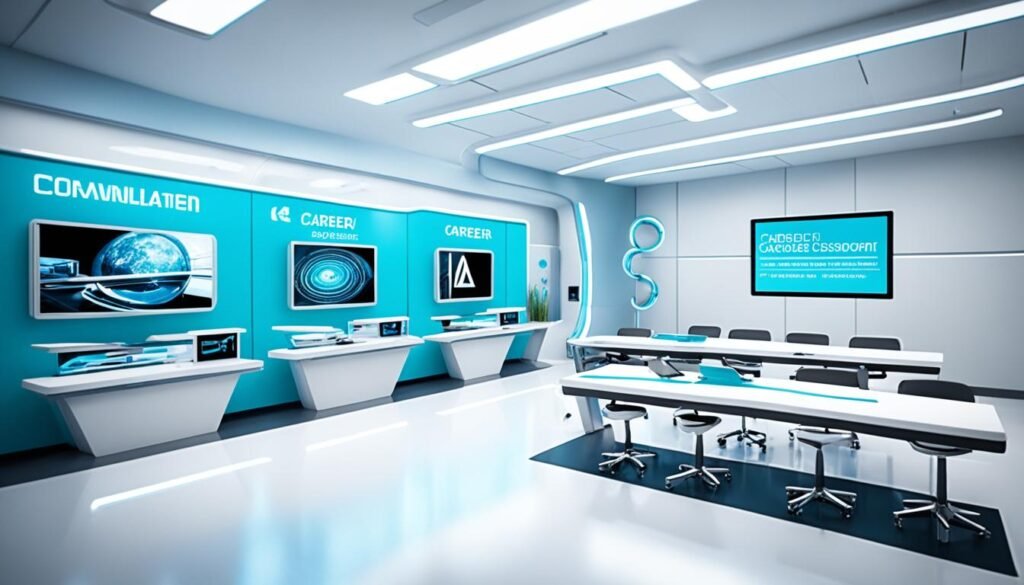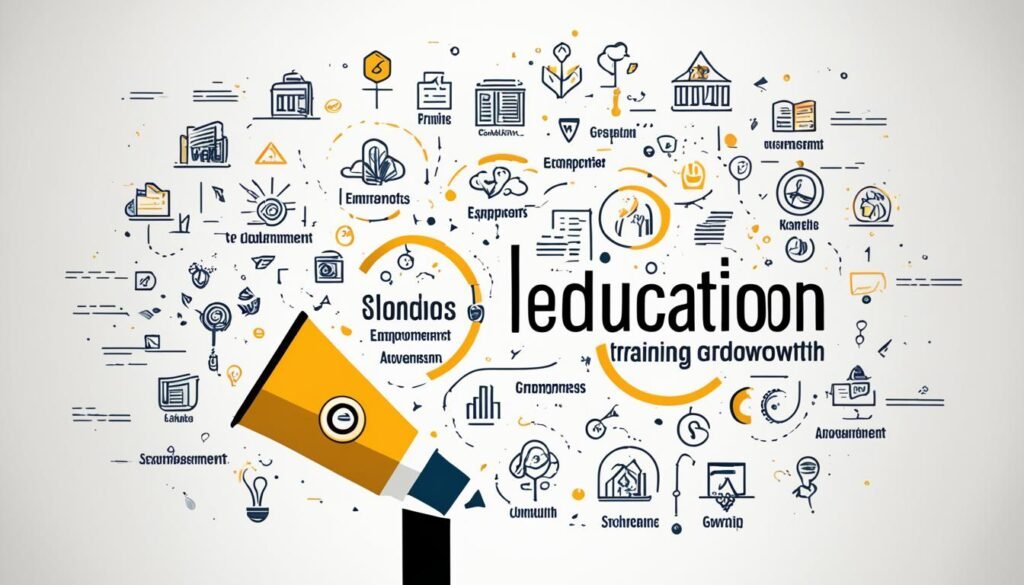As I navigate my own professional journey, I’ve come to realize the vital role that education plays in career advancement. Choosing the right educational path can make all the difference in unleashing your career potential and achieving the success you desire. Education provides you with the knowledge, skills, and credentials necessary to excel in your chosen field, opening doors to new opportunities and propelling you towards your career goals.
In this article, I will explore the importance of intentional career planning and how education can maximize your career development opportunities. We will delve into the impact of online learning platforms and vocational training programs, as well as provide you with resources and strategies for navigating the educational landscape and creating your personal brand through skill enhancement training. By following the right educational path, you can unlock your full potential and achieve professional growth.
Key Takeaways:
- Choosing the right educational path is crucial for unleashing your career potential.
- Education plays a vital role in career advancement, providing you with the necessary skills, knowledge, and credentials.
- Intentional career planning involves self-assessment and setting clear goals aligned with your personal values.
- Online learning platforms offer flexibility and accessibility, enabling working professionals to acquire new skills.
- Vocational training programs bridge the skills gap and prepare you for career success in specific fields.
The Necessity of Intentional Career Planning
Intentional career planning is crucial for long-term success and satisfaction in your professional life. It involves self-assessment, executive coaching, and peer-to-peer learning to maximize your career potential. By strategically planning your career path and aligning it with your goals, you can make informed choices that lead to professional growth and fulfillment.
Self-Assessment for Career Clarity
Self-assessment plays a vital role in gaining clarity about your strengths, interests, and values. By understanding your unique attributes, you can identify career goals that align with your personal values and aspirations. Self-assessment tools and exercises can help you evaluate your skills, interests, and personality traits, unlocking insights into potential career paths that will bring you fulfillment.
The Role of Executive Coaching in Career Development
Executive coaching provides valuable guidance and support in navigating career challenges and making strategic decisions. A skilled coach can help you identify your strengths, capitalize on opportunities, and overcome obstacles to achieve your professional goals. Through one-on-one coaching sessions, you can gain valuable insights, enhance your leadership skills, and develop a roadmap for career success.
Benefits of Peer-to-Peer Learning Environments
Peer-to-peer learning environments, such as networking groups and mentorship programs, offer unique opportunities to learn from and connect with professionals in your field. By engaging in these environments, you can broaden your knowledge, gain valuable industry insights, and expand your professional network. Through mentorship and peer collaboration, you can enhance your skills, receive feedback, and accelerate your career growth.
In conclusion, intentional career planning is essential for unlocking your full potential and achieving professional success. Through self-assessment, executive coaching, and peer-to-peer learning, you can make informed decisions, develop necessary skills, and build a strong foundation for your career journey.
Education for Career Advancement: A Strategic Approach
A strategic approach to education is crucial for career advancement. It involves aligning your educational choices with your career goals and aspirations. By identifying the skills and knowledge needed in your desired field, you can select educational programs and courses that will enhance your expertise and marketability.
Aligning Education with Career Goals
When planning your educational journey, it is important to consider how your chosen courses and programs align with your career goals. Take the time to assess the specific skills and knowledge that are required in your desired field. This will help you make informed decisions about which educational opportunities will best contribute to your professional growth.
For example, if you aspire to a leadership role in the tech industry, you may want to pursue a Master’s degree in Computer Science or a specialized certification in project management. By aligning your education with your career goals, you can acquire the necessary qualifications that will make you a competitive candidate in your field.
Importance of Accountability in Educational Choices
Accountability plays a crucial role in ensuring that you stay committed to your educational choices and effectively utilize the opportunities available to you. By holding yourself accountable, you can maintain a proactive approach to your career development.
Setting clear educational goals is the first step towards accountability. Define the specific outcomes you want to achieve through your education and establish a timeline for reaching these goals. Break down your goals into smaller milestones to help track your progress and stay motivated.
“Accountability breeds response-ability.” – Stephen R. Covey
Seeking support from mentors or accountability partners can also greatly enhance your accountability. Share your educational goals with someone you trust and request their guidance and encouragement as you progress. Regular check-ins and discussions can help keep you focused and motivated along your educational journey.
Remember, being accountable for your education means taking ownership of your learning and actively seeking opportunities for growth. By staying committed to your educational choices, you can maximize the benefits of your educational journey and propel your career forward.
Maximizing Career Development Opportunities
To maximize career development opportunities, it is essential to embrace continuous learning and growth. Two effective ways to enhance your career prospects and stay competitive in today’s job market are through advanced learning programs and professional development courses. These avenues offer valuable knowledge, skills, and credentials that can propel your career forward.
Enhancing Careers Through Advanced Learning Programs
Advanced learning programs, such as graduate degrees or specialized certifications, provide an in-depth understanding of specific subjects or industries. These programs offer comprehensive coursework and practical training, equipping individuals with the expertise needed to excel in their chosen field. By pursuing advanced learning programs, you can demonstrate your commitment to professional growth and increase your marketability to potential employers.
Advanced learning programs are designed to immerse you in a specific subject area, allowing you to develop specialized knowledge and skills. They often involve intensive coursework, research projects, and interactions with industry experts. By delving deep into your chosen field, you can become an authority and stand out among your peers.

Additionally, advanced learning programs often provide networking opportunities, allowing you to connect with professionals and leaders in your industry. Building a strong network can provide access to valuable resources, mentorship, and career advancement opportunities.
Investing in Professional Development Courses
Professional development courses are designed to enhance specific skills that are directly relevant to your career. These courses focus on practical, industry-specific knowledge and provide immediate application in the workplace. They are often shorter in duration and can be taken alongside your current job or commitments.
Professional development courses offer a wide range of topics, from project management and leadership to digital marketing and data analysis. By investing in these courses, you can acquire new skills, keep up with emerging trends, and broaden your professional toolkit.
Professional development courses can be delivered in various formats, including in-person workshops, online programs, or a combination of both. The flexibility of online courses allows you to learn at your own pace and fit your learning around your schedule.
Whether you choose to pursue advanced learning programs or professional development courses, both avenues provide valuable opportunities for career growth and development. By continuously expanding your knowledge and skill sets, you can position yourself for success and take advantage of the ever-evolving job market.
The Impact of Online Learning Platforms on Career Growth
Online learning platforms have revolutionized the way individuals access education and have a significant impact on career growth. These platforms offer a wide range of courses and programs that can be accessed anytime and anywhere, providing flexibility for working professionals.
The convenience and accessibility of online learning make it easier for individuals to acquire new skills, pursue further education, and stay up to date with industry trends. Whether you want to learn a new programming language, enhance your business management skills, or acquire industry-specific certifications, online learning platforms have got you covered.
One of the key advantages of online learning platforms is their ability to cater to various learning styles and preferences. They offer a variety of multimedia resources, interactive exercises, and assessments to accommodate different learning needs. This allows individuals to customize their learning experience and engage with the content in a way that suits them best.
Moreover, online learning platforms provide networking opportunities that can significantly impact career growth. Learners have the opportunity to engage with professionals in their field, join online communities and discussion forums, and expand their professional network. Networking plays a crucial role in career advancement, and online platforms offer a virtual space for individuals to connect, collaborate, and learn from each other.
As the demand for continuous learning and upskilling grows in the ever-changing job market, online learning platforms offer a convenient and cost-effective solution. They enable individuals to stay competitive, acquire new knowledge and skills, and demonstrate their commitment to professional growth.
Vocational Training Programs: Bridging the Skills Gap
Vocational training programs play a vital role in bridging the skills gap and preparing individuals for career success. These programs focus on providing practical training and development of specific vocational skills that are in demand in the job market. By identifying and acquiring these vocational skills, individuals can position themselves for career breakthroughs and opportunities. Vocational education offers hands-on learning experiences and real-world applications, equipping individuals with the skills and knowledge needed to excel in their chosen field.

Identifying Vocational Skills for Career Success
Identifying the right vocational skills is crucial for achieving career success. These skills can vary depending on the industry and job role, but they often include technical competencies, problem-solving abilities, critical thinking skills, and effective communication. Vocational training programs help individuals develop these skills through practical training, simulations, and real-life projects. By honing these vocational skills, individuals become more competitive in the job market and increase their chances of career growth and advancement.
How Vocational Education Can Lead to Career Breakthroughs
Vocational education offers a unique pathway to career breakthroughs. By focusing on specific vocational skills, individuals can gain specialized expertise that sets them apart from other job candidates. This specialized knowledge and hands-on experience make individuals valuable assets to employers, increasing their chances of securing job opportunities and advancing in their careers. Moreover, vocational education often provides industry connections, internships, and job placement assistance, further enhancing career prospects and facilitating career breakthroughs.
With the ever-increasing demand for skilled professionals in various industries, vocational training programs have become a critical component of career development. By acquiring vocational skills through practical training and hands-on experience, individuals can bridge the skills gap, position themselves for career success, and achieve breakthroughs in their professional journeys.
| Vocational Skills | Career Opportunities |
|---|---|
| Automotive technology | Automotive technician, mechanic, service manager |
| Information technology | Software developer, network administrator, cybersecurity analyst |
| Culinary arts | Chef, pastry chef, restaurant manager |
| Electrical engineering | Electrical engineer, electrician, power systems technician |
| Healthcare | Registered nurse, medical assistant, dental hygienist |
Continuing Education Options for Lifelong Career Advancement
Continuing education plays a vital role in lifelong career advancement. It encompasses the pursuit of further education and the acquisition of new skills and knowledge throughout one’s professional journey. To remain competitive in a rapidly evolving job market and adapt to industry changes, individuals must invest in their ongoing learning and skill development.
There are various continuing education options available that cater to different learning preferences and schedules. Workshops, seminars, conferences, and online courses offer flexible opportunities for individuals to enhance their skills and expand their knowledge base. These options allow professionals to stay relevant in their field and gain a competitive edge.
By engaging in continuing education, individuals can unlock new career opportunities and advance their careers. Lifelong learning is a key component of career success and personal growth. It empowers individuals to stay updated with current trends and advancements in their industry, enabling them to make informed decisions and contribute meaningfully to their chosen profession.
Investing in continuing education is an investment in oneself. It demonstrates a commitment to personal and professional development, which can lead to increased job satisfaction, greater earning potential, and a broader network of industry connections. Furthermore, by consistently seeking out new learning opportunities, individuals can develop a growth mindset and remain adaptable in an ever-changing work environment.
Creating a Personal Brand through Skill Enhancement Training
Skill enhancement training provides individuals with the opportunity to develop and showcase their expertise, contributing to the creation of a strong personal brand. By focusing on enhancing specific skills relevant to their field, individuals can position themselves as experts and thought leaders.
Skill enhancement training can take various forms, such as workshops, certifications, or specialized courses, that deepen knowledge and refine skills. By investing time and effort in further developing their abilities, individuals can establish credibility, attract opportunities, and differentiate themselves in a competitive job market.
Building a personal brand through skill enhancement training involves leveraging the acquired skills to establish oneself as a reputable authority. This can be done by actively contributing to industry discussions, sharing knowledge through publications or presentations, and engaging with relevant professional communities.
By crafting a distinct personal brand, individuals can gain visibility, build trust with their audience, and increase their professional opportunities. A strong personal brand is an asset that sets individuals apart and opens doors to new collaborations, career advancement, and overall success.

Career Advancement Resources: Navigating the Educational Landscape
Navigating the educational landscape for career advancement can be challenging, but various resources are available to support individuals in their journey. Whether you’re just starting your professional journey or looking to take the next step in your career, there are career advancement resources that can help you achieve your goals.
Turning Career Development Programs to Pathways of Growth
Career development programs provide structured opportunities for skill development and professional growth. These programs encompass a range of activities, including mentorship, coaching, networking events, and specialized workshops. By actively participating in these programs, you can gain valuable insights, expand your knowledge, and enhance your career prospects.
Joining mentorship programs allows you to connect with experienced professionals who can provide guidance and share their wisdom. Mentors can offer practical advice, help you navigate challenges, and provide valuable insights into your chosen career field. Similarly, coaching programs provide a more personalized approach, focusing on specific areas of development and helping you set and achieve goals.
Networking events are also essential for career advancement, as they allow you to expand your professional network. Building meaningful connections with colleagues, industry experts, and potential employers can open doors to new opportunities and provide valuable support throughout your career journey. Attending specialized workshops and conferences further enhances your skillset and keeps you updated on the latest industry trends and innovations.
By leveraging career development programs as pathways of growth, you can continuously enhance your skills, broaden your knowledge, and position yourself for future success.
Assessment of Career Advancement Strategies
Evaluating your progress, identifying areas for improvement, and making informed decisions about your educational and career paths are crucial steps in career advancement. Assessing your career advancement strategies allows you to gain valuable insights into what is working well and what needs adjustment.
Regularly assess the strategies you have implemented to advance your career. Consider the impact they have had on your professional growth and whether they align with your goals. Reflect on the skills you have acquired, the knowledge you have gained, and the connections you have made through your chosen strategies.
Seek feedback from mentors, coaches, and trusted colleagues to gain different perspectives on your career advancement strategies. Their insights can provide valuable guidance and help you identify areas where you can further optimize your approach.
Based on your assessment, make adjustments to your strategies as needed. This may involve exploring new educational opportunities, seeking additional certifications or qualifications, or diversifying your networking efforts. Keep an open mindset, embrace continuous learning, and adapt your strategies to align with changing industry demands and emerging trends.
Remember, career advancement is a journey that requires ongoing assessment, learning, and growth. By evaluating and optimizing your career advancement strategies, you can stay on track and maximize your potential for success.

| Benefits of Career Development Programs | Importance of Strategy Assessment |
|---|---|
| 1. Access to mentorship and coaching | 1. Gain insights for improvement |
| 2. Networking opportunities | 2. Identify areas for growth |
| 3. Skill enhancement workshops | 3. Align strategies with goals |
| 4. Stay updated on industry trends | 4. Embrace continuous learning |
Conclusion
As I conclude this article on unleashing your career potential through education, it is evident that choosing the right educational path is a critical foundation for professional growth. By carving out your unique educational pathway and aligning it with your career goals, you can acquire the skills, knowledge, and credentials necessary to excel in your chosen field.
Education plays a vital role in career advancement by offering opportunities for skill enhancement, personal development, and networking. Investing in your education and staying committed to lifelong learning is essential in unlocking your full potential and attaining the professional growth you desire.
Remember, education is the key to opening doors to a fulfilling and successful professional journey. By taking intentional steps towards personal and professional development, you can carve out a unique path that leads to continuous growth and achievement. Embrace the opportunities education presents, and embark on the journey toward unleashing your career potential!
FAQ
What is the importance of intentional career planning?
How can I align my education with my career goals?
How can advanced learning programs and professional development courses enhance my career?
How do online learning platforms impact career growth?
What role do vocational training programs play in bridging the skills gap?
What are the options for continuing education in lifelong career advancement?
How can skill enhancement training help in creating a personal brand?
What resources are available for navigating the educational landscape?
How can I carve out my unique educational pathway for professional growth?
Source Links
- https://www.linkedin.com/pulse/unleashing-your-potential-navigating-path-fulfilling-career-rotiwale
- https://www.hersnetwork.org/programs/unleash-your-career/
- https://www.everand.com/book/489580857/Unleash-Your-Career-Potential-7-Steps-to-Living-Your-Dream
